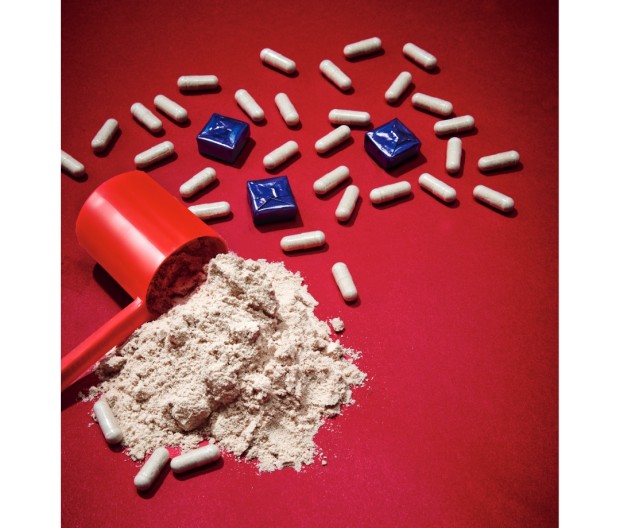Need more reasons to take creatine? It is one of the most researched supplements for building strength and body mass. And despite an overwhelming amount of published research, some confusion remains about how to supplement creatine for maximum gains. Many athletes begin a creatine loading phase in the first week of use, taking up to five times the standard dose. The goal of a loading phase is to build up creatine stores faster and to see the benefits of the supplement sooner.
You can do curls, lift weights, and squats all day, but without the right nutrients, you'll never reach your full potential. Muscles require a specific pool of amino acids and macronutrients to properly repair and grow again. There are countless products packed with vitamins, minerals and other nutrients that claim to help build muscle - and science shows that some of them make small gains and help you stay energized during your workout.
But we're looking for the big ones - the supplements backed by the strongest scientific evidence that's proven to help you put on mass. And if you think protein is everything to be chiseled, then listen: Creatine is the LeBron James of supplements, says Rehan Jalali, board-certified sports nutritionist and president of the Supplement Research Foundation.
This article explains what the loading phase for creatine is and whether or not you need to load creatine at all. It uses evidence-based information about its potential benefits, whether creatine is safe, what are the side effects, when is the best time to take creatine, and more.
What does creatine do?
“It is the most scientifically proven sports supplement on the market today. Hundreds of clinical studies show it can increase lean body mass, increase strength, increase energy levels and increase muscle size," says Jalali.
Creatine can be thought of as an "energy shuttle". Energy in the body is called adenosine triphosphate (ATP). After this energy is expended, a phosphate is lost to form adenosine diphosphate (ADP).
ADP cannot be used as energy in the body until it is converted back into ATP. Creatine supplementation increases ATP stores by providing another phosphate group for ADP to form ATP.
In short, creatine helps produce energy for your muscle tissue to use for those final few reps.
Benefits of Creatine
Lose weight
A study published in the journal Nutrients found that 30 athletes who took creatine during a complex four-week training program experienced improvements in body fat percentage, jump height, and peak jump power compared to before the workout.
Increase athletic performance
In the same study referenced above, researchers concluded that creatine may help athletes increase peak muscle strength and peak power in areas such as half squats, plyometric jumps, and off-season 30-meter sprints, while reducing muscle damage caused by complex training to reduce.
Because creatine produces more energy for muscles, it helps athletes train at higher intensities—more work, sets, and/or reps—for longer periods of time, resulting in increased strength, muscle mass, and performance due to higher quality and volume can training.
build muscles
While research shows that creatine can help you lose fat (and thereby show off your muscles better), keep in mind that the magnitude of the mass advantage varies greatly from person to person, says Brian St. Pierre, MS, RD, CSCS, Director of Performance Nutrition at Precision Nutrition. A 2022 meta-analysis published in Nutrients confirms that creatine is an effective dietary supplement for increasing muscle strength, muscle mass, and athletic performance in young, healthy populations across a variety of dosing strategies and fitness levels. However, the evidence-based research on the benefits of creatine supplementation for muscle growth in the elderly or patients with muscle-related disorders is not extensive enough to make comparable comparisons.
gain strength
Similar to muscle mass, an analysis of 22 creatine supplement studies in the Journal of Strength and Conditioning Research found that results are highly individualized when it comes to strength gain. On average, however, the study found that those who took creatine were 8 percent stronger at maximum effort and could do 14 percent more reps.
Improve cognitive function
In addition to the physical benefits, studies continue to suggest that creatine may play a role in improving cognitive function. In particular, research is currently underway into what effects, if any, creatine has on sleep. Some human studies have shown that creatine improves mood, balance, and reaction time after periods of sleep deprivation. More research is currently needed to determine the direct effects of creatine on sleep markers, such as: B. the sleep quality to determine.
Is Creatine Safe?
After more than three decades of extensive research into creatine supplementation, the International Society of Sports Nutrition states: “Creatine monohydrate supplementation is not only safe, but has been reported to have a number of therapeutic benefits in healthy and diseased populations , from infants to toddlers old." So yes, creatine is safe, as is the loading phase for creatine.
Shana vak
How to use creatine
Using creatine is easy: if you're taking a powder, just mix it up and dissolve it in any liquid you like to drink. If you're taking a capsule form, like any vitamin, take it with water.
Research shows that a daily serving of 3 to 5 grams of creatine monohydrate produces the most effective results. For most athletes, larger servings provide more creatine than the body can absorb. This excess flows through your system and is literally flushed down the drain.
Creatine can be taken at any time of the day, even on an empty stomach. If you are also taking a powdered protein supplement, the creatine can be mixed in. Although creatine is made up of amino acids, it does not have the same effects as consuming dietary protein after a workout and is not a substitute for protein powder supplementation.
When should you take creatine?
New evidence suggests greater benefits when creatine is taken post-workout versus before. A study published in the Journal of the International Society of Sports Nutrition found that men gained more muscle and muscle mass when they took the supplement post-workout rather than before. te that there are limited studies -- some with conflicting data -- and more research is needed for a solid conclusion.
Do I need to load creatine?
Do you need to load creatine? If you want the fastest results, then yes. At the standard dose of 3 to 5g per day, it takes about a month for an athlete's creatine stores to fill up. The theory behind the loading phase for creatine is that by taking a significantly higher dosage when beginning supplementation, the body's creatine stores will fill up faster and an athlete will see the benefits sooner.
"[Loading] saturates your muscle creatine stores,” says Mike Roussell, PhD, a nutritionist. "You couldn't load, but it would take you a lot longer to reach the maximum potency of creatine."
The ISSN supports the creatine loading phase as the fastest way to increase muscle creatine stores.

Unsplash
How to load creatine?
Supporting studies use 0.3 g/kg body weight (~20 to 25 g/day) of creatine monohydrate daily for the first five to seven days of use, and then decrease to 3 to 5 g daily. However, the most important aspect of taking creatine is to consistently take 3 to 5 g/day to maintain full creatine stores.
The larger dosage for a creatine loading phase should be spread throughout the day, but no more than 10g at a time to avoid possible gastrointestinal upset. If you are unable to absorb creatine, taking a lower maintenance dose of creatine monohydrate (ie 3-5g/day) will still replenish an athlete's creatine stores for a longer period of 3-4 weeks.
Should I train during a creatine loading phase?
There's no reason not to exercise during the creatine loading phase. The supplement alone won't cause you to gain muscle mass, says St. Pierre. For creatine supplements to be effective, exercise is necessary.
When combined with strength training, creatine can help increase reps, build strength, and fuel muscle growth.
Research suggests that creatine stores can remain high if creatine supplementation is omitted here and there. However, it is not recommended to skip a day. However, creatine should also be taken on rest days in order to maintain the creatine stores in the muscles.
Are there side effects in the creatine loading phase?
Some adverse effects of the creatine loading phase have been reported. Creatine doses of more than 10g per single serving have been linked to gastrointestinal complaints such as diarrhea. The risk of adverse gastrointestinal side effects may be reduced if people in a loading phase take smaller doses (e.g., four or five 5 g servings per day) more frequently. Ongoing research has also shown no association between normal creatine consumption and increased fat mass, increased water retention or dehydration, kidney damage, or hair loss.
As one of the first nutritional supplements on the market, creatine is still one of the most effective. Is a creatine supplement necessary? It's not strictly necessary to build muscle and increase performance, but it will certainly yield better results in half the time.

